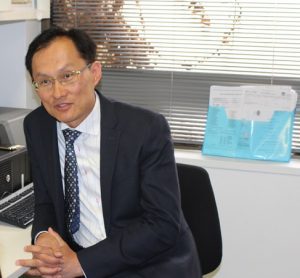
“I didn’t recognise the symptoms of ovarian cancer – I should’ve gone to see a doctor earlier but I was busy with a new job and thought they were just a part of menopause,” says Glenda Brown.
Ms Brown was diagnosed 15 months ago and has now decided to share her journey ahead of Ovarian Cancer Awareness Month in a bid to encourage other women to get checked.
The Ingleburn resident, who was diagnosed with stage 3 of the disease and is still being treated at Liverpool Hospital, said she dismissed her bloated stomach as menopause.
“I was always tired and feeling full sooner than normal after eating a lot less than usual, but I really didn’t think anything of it,” she said.
Ms Brown, who is under the care of gynaecologic oncologist Dr Unine Herbst and Dr Michelle Harrison said she has received great treatment.
“I’m very lucky my ovarian cancer was caught at stage 3, any later and I probably wouldn’t be here today.
“Most women don’t think twice about where they get treatment but Dr Herbst, Dr Harrison and the team at Liverpool Hospital have really looked after me,” she said.
Director of gynaecological oncology at Liverpool Hospital, associate professor Felix Chan said the symptoms of ovarian cancer are often described as silent, because they mimic menopause, menstrual, gastro-intestinal, or back problems.
[social_quote duplicate=”no” align=”default”]“The symptoms of ovarian cancer can first appear on the surface as other diseases, such as irritable bowel syndrome or menopause so when it comes to rare cancers like this, it can be difficult to diagnose,” Prof Chan said.[/social_quote]
Almost 1,500 Australian women are diagnosed with ovarian cancer every year which is why Prof Chan said more research into ovarian cancer detection was needed.
“Screening procedures such as a gynaecological assessment, vaginal ultrasound and the CA 125 blood marker are currently the main ways to test for ovarian cancer in women,’’ he said.
“If symptoms last more than two weeks, I’d recommend being evaluated by a gynaecologic physician as soon as possible.
“I strongly believe that further research into ovarian cancer prevention is needed to catch the cancer in its earlier stages.
Contact Ovarian Cancer Australia on 1300 660 for more information.
